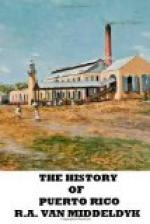The king duly recompensed the brave defenders. The governor was made Chevalier of the Order of Santiago and received a money grant of 2,000 ducats. Captain Amezquita received 1,000 ducats, and was later appointed Governor of Cuba. Captain Botello also received 1,000 ducats, and others who had distinguished themselves received corresponding rewards.
Puerto Rico’s successful resistance to this invasion encouraged the belief that, provided the mother country should furnish the necessary means of defense, the island would end by commanding the respect of its enemies and be left unmolested. But the mother country’s wars with England, France, and Holland absorbed all its attention in Europe and consumed all its resources. The colonies remained dependent for their defense on their own efforts, while privateers, freebooters, and pirates of the three nations at war with Spain settled like swarms of hornets in every available island in the West Indies.
CHAPTER XX
DECLINE OF SPAIN’S POWER—BUCCANEERS AND FILIBUSTERS
1625-1780
The power of Spain received its death-blow during the course of the war with England. The destruction of the Armada and of the fleets subsequently equipped by Philip II for the invasion of Ireland were calamities from which Spain never recovered.
The wars with almost every European nation in turn, which raged during the reigns of the third and fourth Philips, swallowed up all the blood-stained treasure that the colonial governors could wring from the natives of the New World. The flower of the German and Italian legions had left their bones in the marshes of Holland, and Spain, the proudest nation in Europe, had been humiliated to the point of treating for peace, on an equal footing, with a handful of rebels and recognizing their independence. France had four armies in the field against her (1637). A fleet equipped with great sacrifice and difficulty was destroyed by the Hollanders in the waters of Brazil (1630). Van Tromp annihilated another in the English Channel, consisting of 70 ships, with 10,000 of Spain’s best troops on board. Cataluna was in open revolt (1640). The Italian provinces followed (1641). Portugal fought and achieved her emancipation from Spanish rule. The treasury was empty, the people starving. Yet, while all these calamities were befalling the land, the king and his court, under the guidance of an inept minister (the Duke of Olivares), were wasting the country’s resources in rounds of frivolous and immoral pleasures, in dances, theatrical representations, and bull-fights. The court was corrupt; vice and crime were rampant in the streets of Madrid.[40]
Under such a regime the colonists were naturally left to take care of themselves, and this, coupled with the policy of excluding them from all foreign commerce, justified Spain’s enemies in seeking to wrest from her the possessions from which she drew the revenues that enabled her to make war on them. Englishmen, Frenchmen, and Hollanders made of the Antilles their trysting-ground for the purpose of preying upon the common enemy.




